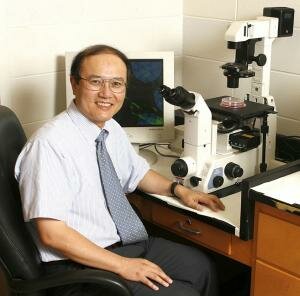New Agent Chokes Off Energy Supply, Kills Cancer Cells
Cancer cells grow so fast that they can outstrip their blood supply, leaving them short of oxygen. The cells then produce energy in a way that needs less oxygen but more sugar.
Researchers at the Ohio State University Comprehensive Cancer Center-Arthur G. James Cancer Hospital and Richard J. Solove Research Institute have designed an experimental drug that chokes off that sugar supply, causing the cells to self destruct.
The agent, called OSU-CG12, is an example of a new class of anticancer drugs called energy-restriction mimetic agents. It is described in a paper published recently in the Journal of Biological Chemistry.
"Energy restriction may offer a powerful new strategy for treating cancer because it targets a survival mechanism used by many types of cancer," says principal investigator Ching-Shih Chen, professor of medicinal chemistry, of internal medicine and of urology.
"Our study proves that this new agent kills cancer cells through energy restriction. This is important because it shows that it is possible to design drugs that target energy restriction, and it is exciting because energy-restricting mimetic agents may also be useful for other diseases, including metabolic syndromes, diabetes, cardiovascular disease and obesity," Chen adds.
Energy-restricting mimetic agents cause changes in cancer cells that are similar to those that occur in cancer cells deprived of their main energy source, the sugar glucose.
To design the new agent, Chen and his collaborators started with a drug called ciglitazone, which had been developed to treat type II diabetes but also showed anticancer activity in laboratory experiments.
That original drug produced its anti-diabetic effects by activating a protein called PPAR-gamma and a number of genes. The same mechanism was thought responsible for the drug's anticancer effects. Chen and his colleagues showed, however, that the anticancer effects were due to a different mechanism, one involving energy restriction.

"Dr. Ching-Shih Chen. (Credit: Image courtesy of Ohio State University Medical Center)"
Source: Ohio State University Medical Center
|